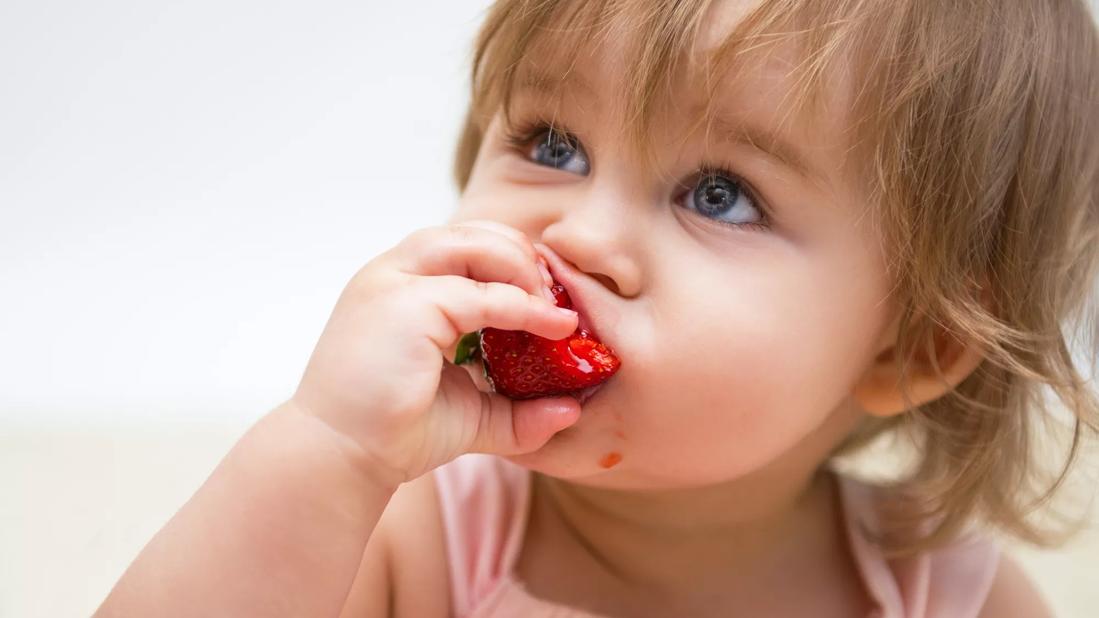It’s likely a short-term sensitivity (not an allergy) to acidic foods

Image content: This image is available to view online.
View image online (https://assets.clevelandclinic.org/transform/55c6cd1b-1916-460f-9367-3d352af32320/BabyEatingStrawberry_jpg)
Are Food Allergies Causing Your Baby’s Diaper Rash?
The skin is our largest organ. When it’s irritated, it’s almost impossible to ignore.
Advertisement
Cleveland Clinic is a non-profit academic medical center. Advertising on our site helps support our mission. We do not endorse non-Cleveland Clinic products or services. Policy
When it’s our baby’s skin that’s irritated, it’s somehow even worse.
Diaper rash comes in many varieties and has many causes, so it often takes time and experimentation to figure out what’s bedeviling your baby’s bum. If you’ve ruled out the diaper, wipe or — in the case of cloth diapers — laundry detergent as the cause of the irritation, it may be time to look at what your kiddo’s consuming.
First things first, let’s get our vocabulary straight. In the vast majority of cases, a child’s diaper rash isn’t the result of a food allergy. It’s the result of an intolerance.
While a lot of people use the terms “allergy” and “intolerance” interchangeably, they have specific medical definitions.
If a diaper rash is the only symptom you’re seeing, it’s unlikely your child is dealing with a food allergy.
An allergic reaction occurs when your immune system perceives the food you’re eating as a threat. The resulting response can look like a lot of different things, from hives and shortness of breath to full-blown anaphylaxis.
Allergic reactions can be severe and potentially life-threatening. If you think your child has a food allergy, you should get them immediate medical attention.
Advertisement
A food intolerance isn’t exactly a barrel of monkeys either, but it also isn’t nearly as serious. “Intolerance” means your digestive system — or in this case, your wee one’s digestive system — can’t properly break a food item down.
Because food intolerances are purely a digestive issue, so, too, are the symptoms. Think diarrhea. It’s not pleasant, but — provided your baby isn’t dehydrated — it’s not an emergency either.
And the transition from breast milk (or formula) to solid food is a big one. A few bumps in the road are to be expected, especially if your baby’s an adventurous eater.
According to pediatric allergist Sandra Hong, MD, “If a child has a food intolerance that causes frequent loose bowel movements, it will cause their buttocks to become red and sore, primarily because of the constant cleaning and irritation from frequent diaper changes.”
In addition to monitoring their bowel movements, look out for redness and irritation around your little one’s mouth and anus. That could be a sign that they aren’t quite ready for the newest addition to their menu.
Acidic foods can be particularly rough on tiny tummies. Among the most common culprits are:
In other words: If it gives you heartburn, it could give your baby butt burn.
That doesn’t mean fruit is off the menu. Apples, bananas, papayas and melons of all types are still fair game.
If you’ve dealt with traditional diaper rash before, you’re probably already familiar with the basics of treatment and prevention. Dr. Hong reminds us that, whatever the cause of the diaper rash, “good barrier technique and a diaper cream high in zinc can be helpful.”
But how do you prevent diaper rash provoked by a food sensitivity?
You cut the offending food — or foods — from your baby’s diet.
Keep in mind, you’re not robbing your child of pineapple salsa for life. You’re just giving their little bodies time to adjust to solid foods before routinizing items they find particularly challenging.
Of course, if your child has a diagnosed food intolerance — like lactose intolerance or gluten sensitivity — you need to feed them accordingly to avoid diarrhea-induced diaper rash.
If your baby’s bum has seen better days, it’s possible that their diet is to blame. Food intolerances are common during the transition to solid food. Try cutting back — or cutting out — high-acid fruits. You’ll be able to reintroduce them as their digestive system adjusts.
Advertisement

Sign up for our Health Essentials emails for expert guidance on nutrition, fitness, sleep, skin care and more.
Learn more about our editorial process.
Advertisement
New treatment offers hope for outgrowing the life-threatening condition
More than 90% of allergic reactions can be linked to these foods
Be prepared, read up, team up, trust your gut and advocate
Try foods first to see if your child has a reaction
Symptoms can be similar, but affect your body in distinct ways
The short answer from a pediatric allergist/immunologist
Shellfish is the top food allergen in adults
OTC meds, rest, fluids and an anti-inflammatory diet can help you get through big and small weather changes
Although it could be used as a moisturizer, this new trend is not recommended
Communicating clear limits helps protect your time, energy and emotional well-being
High cholesterol can be genetic, but testing and treatment can lower your heart disease risk